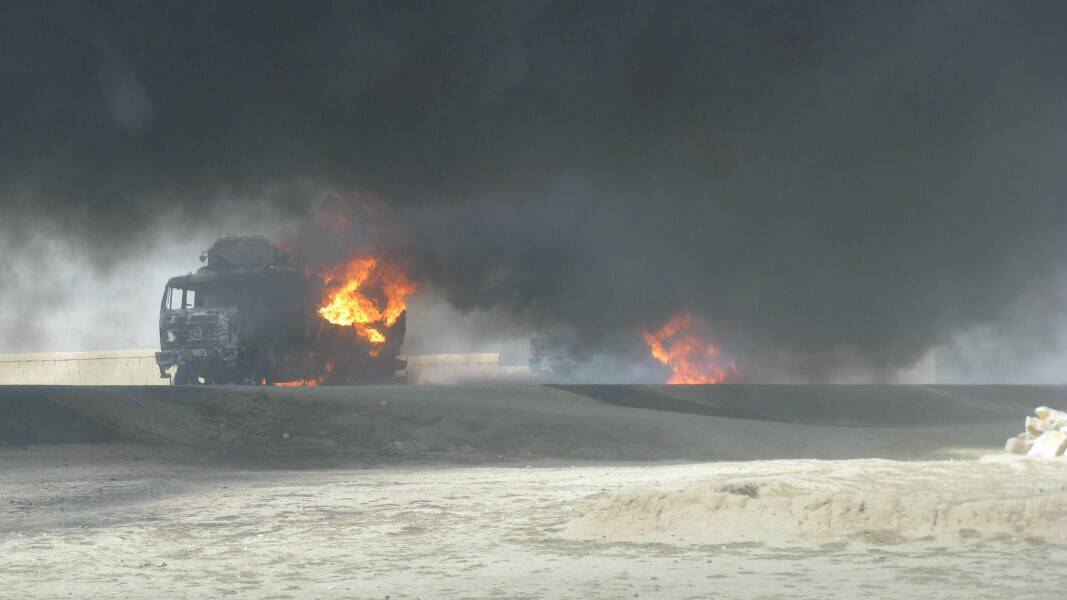Many contractors and service members do not know this but if you were injured in Iraq by an IED in Iraq between the years of 2003-2011, you can file a claim to receive substantial annual compensation. There is a bit of a process for this but this article will explain why this fund exists, who it is for, and how you can file a claim.
Background on the IED Injury Fund
If you served in combat, you are familiar with IEDs. And if you’ve been outside the wire, the likelihood that you or others in your unit / team were in an IED attack is pretty high. If you ever traveled down Route Irish in Baghdad, it was particularly hot with IEDs that killed and injured so many of us. One of the things that I recall vividly during my back-to-back OIF deployments (2004-2005 and 2005-2006) was how quickly insurgents figured out how to defeat our countermeasures to IEDs.
It takes money and a significant network to operate insurgent networks at that pace. But it takes a s*** load of money to develop and implement new IED technology the way insurgents in Iraq were deploying them.
In Iraq, we knew through Intelligence that the sophisticated IEDs that we saw in Central Iraq (i.e. in and around Baghdad, Fallujah, Ramadi, Najaf, etc.) were coming from and being funded by Iran.
If you served in Iraq in the earlier days of the OIF war (circa 2003-2007 ish), you’re probably pretty familiar with EFPs (explosively formed penetrators). All of those were funded, developed, and distributed by Iran.
Banks’ Conspiracy with Iran
When I was deployed overseas as a platoon leader, I assumed that the funding for these insurgent activities were coming purely from our enemies.
Years after I discharged from my service, I was shocked and pretty pissed to learn that foreign banks with US entities were illegally funneling billions of dollars to Iran from 2003-2011 which funded these insurgent activities.
Even though the US and International laws have long had active sanctions against Iran — making it illegal for Iran to access the US financial system — these banks knowingly admitted to transferring hundreds of billions of US Dollars to Iran. These banks even attempted to hide their activities from the US Government but are now being held accountable for their actions.
For example, HSBC Bank admitted to these allegations and paid $1.25 Billion in fines. Credit Suisse paid $536 Million; Commerzbank paid $1.45 Billion; Standard Chartered Bank paid $340 Million; and Barclay’s paid $298 Million. Leading the pack, BNP Paribas paid a staggering $9 Billion. There are still more banks being investigated even now.
Justice for US Victims of State-Sponsored Terrorism Act (USVSST)
The US Government is aggregating these fines into an IED injury fund to help service members who were injured or killed by IEDs / EFPs in Iraq with monetary compensation.
The Justice for United States Victims of State Sponsored Terrorism Act (the “Act”), 34 U.S.C. § 20144 (formerly codified as 42 U.S.C. § 10609), provides for the establishment and administration of the USVSST Fund to provide compensation to certain US persons who were injured in acts of international state sponsored terrorism.
Who Can File an IED Injury Fund (USVSST Fund) Claim?
This depends upon the circumstances of your injuries. To qualify you must meet these minimum requirements:
- You must be a US Citizen or National regardless of whether you were on active-duty, reserve status, or were an independent contractor.
- You, or a surviving family member, were a victim of international terrorism, caused by a foreign state-sponsor of terrorism (i.e. Iran). In this case, this includes surviving or families of deceased service members or contractors injured or killed in an IED or EFP attack in the vicinity of central Iraq between the years of 2003-2011.
The process of determining whether an IED attack was influenced by Iran is not always easy. Attacks caused by Explosive Form Penetrators (EFP’s) can almost always be linked to Iranian influence because Iran developed and proliferated that technology throughout central Iraq. Attacks caused by Explosive Form Penetrators can be distinguished from other roadside bombs by the “pockmarks” and holes in the vehicle armor (see image below).

Vehicle hit by EFP IED in Baghdad, Iraq
Numerous other types of attacks can be traced to Iranian influence, but only after a thorough investigation into the available evidence and characteristics of the attack.
How much compensation will I receive?
If you qualify, the compensation amount is significant and is paid out to you every year, until the fund expires in 2026.
The Fund is comprised of Billions of dollars in fines, sanctions, and penalties against bad actors such as the banks mentioned above. To date, more than $800 million has been issued from the Fund to servicemembers or their surviving family members who were injured or killed by Iranian-funded EFP’s and IED’s.
How do I file an IED Injury Fund (USVSST Fund) Claim?
The USVSST Fund is still accepting applications but expires in 2026. Claimants must submit applications not later than 90 days after the date of obtaining the final judgment.
The process of drawing compensation for the Fund can be complicated.
First, you will need to obtain a legal judgment against the Islamic Republic of Iran. Most frequently, individuals enlist the help of lawyers to handle the process, and—fortunately for the servicemember—the Fund caps the lawyer’s fee at 25% of the recovery.
Once you have overcome that hurdle, you will need to file paperwork within strict deadlines to become eligible for an annual draw.
Given the size and scope of this litigation, numerous lawyers—some untrustworthy—have begun handling these claims. If you are seeking to determine your eligibility or file a claim, ensure that you have first consulted a trustworthy and knowledgeable lawyer who will guide you through the process and ensure that you obtain maximum recovery.
If you need help filing your claim or have questions regarding your eligibility, feel free to contact me directly via email or chat.
– Andrew
ABOUT ANDREW COBOS
Andrew is a Texas-based personal injury lawyer and US Army combat veteran who volunteers his free time as a legal resource partner at Silent Professionals. As a volunteer, Andrew serves as a valuable free resource for thousands of military veterans and military contractors on silentprofessionals.org who may have questions about their legal rights as it pertains to employment and job-related injuries. He can be reached directly to answer your questions via personal email at [email protected] and also makes himself available via online chat at https://tawk.to/andrewcobos1.

